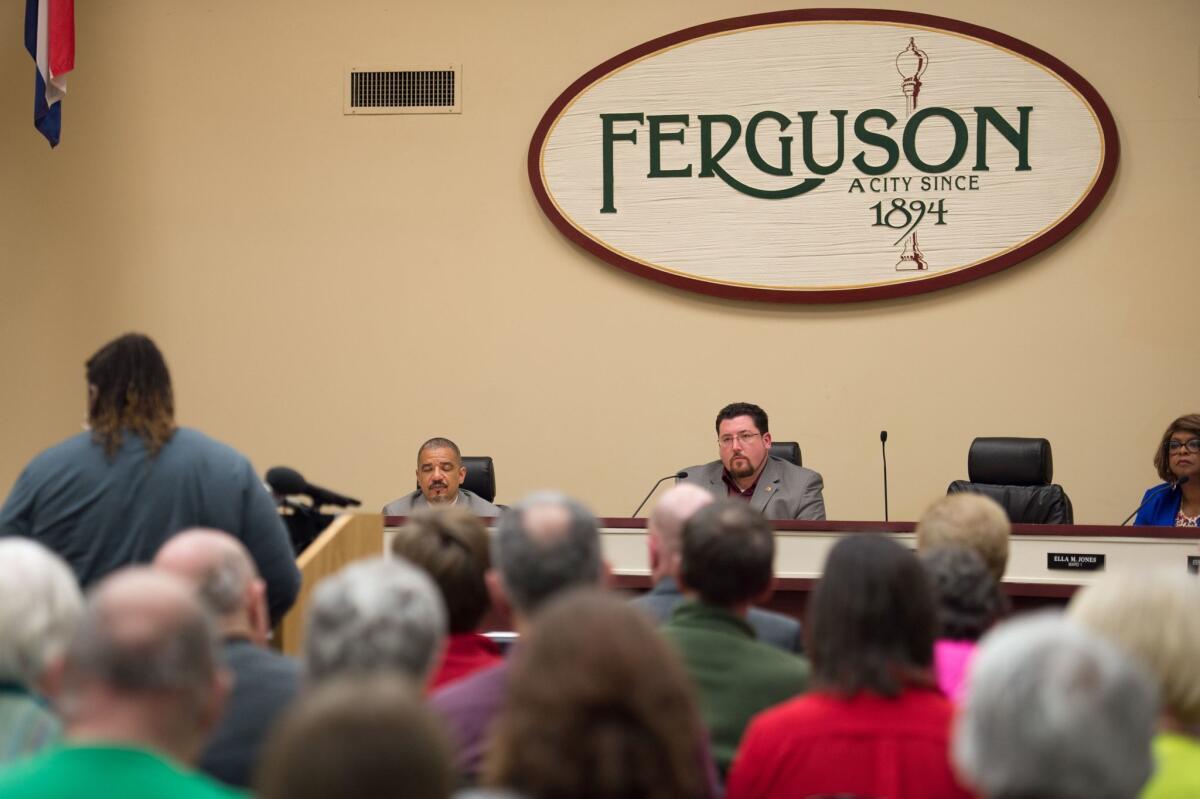In a reversal, Ferguson City Council agrees to reforms and federal oversight

The Ferguson City Council meets on March 8.
After tempting the wrath of the U.S. Justice Department, the troubled St. Louis suburb of Ferguson, Mo., has dropped its resistance to federal oversight of its Police Department and municipal court.
The Ferguson City Council voted 6 to 0 Tuesday to accept a consent decree designed to stop what federal investigators called a pattern of unconstitutional racial discrimination and abuse against the city’s predominantly black population.
The decision marked a reversal from last month, when the council voted to change the agreement the city had negotiated with the Justice Department. That vote led the federal government to sue the city.
“We understand the importance of today’s vote,” Mayor James Knowles III said in a statement after the vote. “Our number one goal is to not only move the city but the entire region forward. We have heard the concerns of the community and we’re looking forward to working with our citizens.”
The Justice Department’s top civil rights official said that she was pleased by the vote and that she looked forward to filing the plan in court in the coming days.
“Tonight, the city of Ferguson, Missouri, took an important step towards guaranteeing all of its citizens the protections of our Constitution,” said Vanita Gupta, head of the Justice Department’s civil rights division.
Since a white Ferguson police officer shot unarmed, black 18-year-old Michael Brown in August 2014, the city of about 21,000 has grappled with how to address the racial inequalities that helped drive angry protesters into the streets for weeks.
A civil rights investigation by the Justice Department found that the city routinely fined its poorest residents to raise revenue and jailed them when they couldn’t pay, sometimes costing them their jobs and prospects of future work.
The investigation has helped drive momentum for reforming how municipal courts across the country handle minor offenses. Defendants everywhere should be treated fairly to prevent them from becoming “trapped in cycles of poverty that can be nearly impossible to escape,” the Justice Department said this week.
In Ferguson, a fine for failing to mow a lawn could cost $531, and city officials ordered a warrant for the arrest of a 90-year-old man who failed to promptly pay for the five fines he received during a single traffic stop.
The federal investigation also found white city employees who sent one another racist emails and fixed traffic tickets for friends, as well as police officers who sicced dogs on unarmed suspects, including a 14-year-old boy curled up into a ball inside a closet.
The Justice Department also criticized the city for failing to document or investigate cases in which the police used force. Of the 151 incidents from 2010 to 2014, the city had deemed only one unjustified.
Flawed policing practices disproportionately fell on blacks, federal investigators found. From October 2012 to October 2014, African Americans were twice as likely to be stopped. Among drivers who were stopped, blacks were less likely than whites to be carrying something illegal.
“These disparities occur, at least in part, because Ferguson law enforcement practices are directly shaped and perpetuated by racial bias,” the Justice
Department said in a lawsuit it filed last month after the City Council tried to back out of a package of reforms.
The council had balked at the cost of implementing the consent decree, which includes an independent monitor who will report to a federal judge and be paid by the city until federal oversight is lifted, which could take several years. The city estimated that the reforms might cost almost $10 million in the first three years.
Gupta tried to ease the city’s cost concerns, promising federal help as long as the concerns were genuine.
The proposed reforms also include holding mediation sessions with community members, installing a police oversight board, rewriting some of the city’s laws and training police.
The city will be banned from using policing as a strategy to raise revenue, and officers will be banned from stopping people just to see whether they have an outstanding warrant, which federal officials found was a common practice.
Ferguson police are also banned from using dogs for crowd control, as they had during the early hours of the August 2014 protests, recalling the harsh police tactics used against civil rights demonstrators in the 1960s.
The consent decree will create a crisis response team for dealing with suspects who are mentally ill or under the influence of drugs or alcohol.
Officers will also be ordered to use body cameras and dashboard cameras. Police will be required to set up an electronic tracking system that will log uses of force and monitor officers’ records to watch for possible patterns of trouble.
The decree also will require Ferguson’s pay for its officers be competitive with other cities its size in St. Louis County, with the aim of maintaining a high-quality force.
Follow @MattDPearce for national news.
More to Read
Sign up for Essential California
The most important California stories and recommendations in your inbox every morning.
You may occasionally receive promotional content from the Los Angeles Times.











